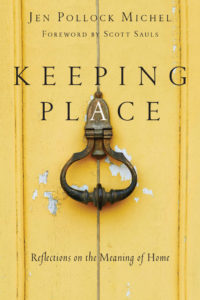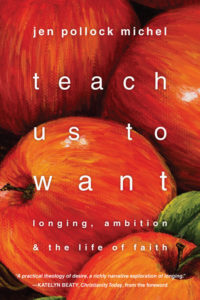Last time Alan Fadling shared his thoughts on an unexpected form of writer’s block. Having written one book, authors often find major hurdles in finishing a second, especially if the first was successful. In working on Write Better (due out October 2019), I also asked Jen Pollock Michel about her experience with what I call Second-Book Syndrome. Here, with her permission, is what she told me.
The writing of my second book, Keeping Place, was pretty tortuous. I think partly it was the onerous sense of expectation, especially in that my first book, Teach Us to Want, won the CT award. I shed many surprising tears about that award, wishing I hadn’t won it. That sounds incredibly ungrateful, and I don’t feel that way now. But at the time, it felt like the surefire way to be a disappointment to people.
 Here’s what eventually helped me:
Here’s what eventually helped me:
1. The recognition that every book is different, requiring different things from you as an author and delivering different things to your readers. (The “books” are “babies” analogy here can certainly be extended: your second child is going to be different than your first, and it would be silly to expect every subsequent child to act and look like the first!) When you can allow your books their distinctiveness, rather than forcing every book to imitate the previous book you’ve written, that can help. Teach Us to Want required a lot of vulnerable self-disclosure. It seemed necessary to the topic of desire. There were a lot of people who resonated with that approach, and truthfully, it was “easy” to do in a first book in the sense that I didn’t have a readership or any certain expectation that people would read.
Writing Keeping Place was totally different, however. First, I wanted the book to reach a broader audience of women and men, so it’s more systematic in approach and probably a little less personal (although there are still personal stories in every chapter). Also, it’s just a different book. I’ve heard some people say they like it better than Teach Us to Want. And I’ve also heard the opposite! So maybe that leads to a second conclusion:
 2. You can’t write books to secure approval from readers. That’s the surest way NOT to say what you’ve been called to say. Of course I want to say helpful things, and I write with readers in mind in the sense of their questions, their fears, their anxieties, their hopes, their longings. But I try to avoid questions like, “Will they like me? Approve of my spirituality? Admire me?” Reading is such a personal thing: if you get hung up on maintaining the approval of readers you already have, your writing is not going to risk and grow. In the “books” are “babies” analogy, I think we have to say that some readers will find some books cuter than others. And that’s ok.
2. You can’t write books to secure approval from readers. That’s the surest way NOT to say what you’ve been called to say. Of course I want to say helpful things, and I write with readers in mind in the sense of their questions, their fears, their anxieties, their hopes, their longings. But I try to avoid questions like, “Will they like me? Approve of my spirituality? Admire me?” Reading is such a personal thing: if you get hung up on maintaining the approval of readers you already have, your writing is not going to risk and grow. In the “books” are “babies” analogy, I think we have to say that some readers will find some books cuter than others. And that’s ok.
3. Get yourself a contract! Force yourself to write! Put yourself under a deadline! I don’t know of a better way of overcoming writers’ block. When I signed for a second contract with IVP for KP (and a third), I didn’t necessarily feel “ready.” You’re not going to feel “ready.” Your first book comes from such a deep place on conviction. I think it asks and attempts answering some of your most pressing questions as a human being. Your second book, without the lifetime of germination your first book might have had, won’t feel as cured. And that’s ok.
Jen
